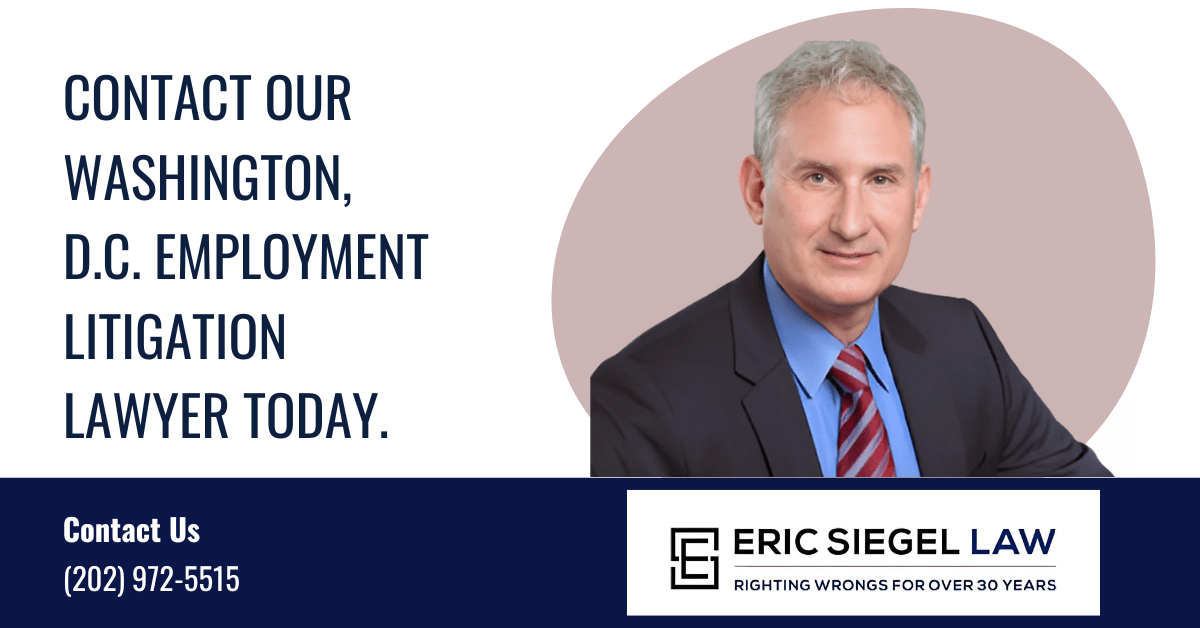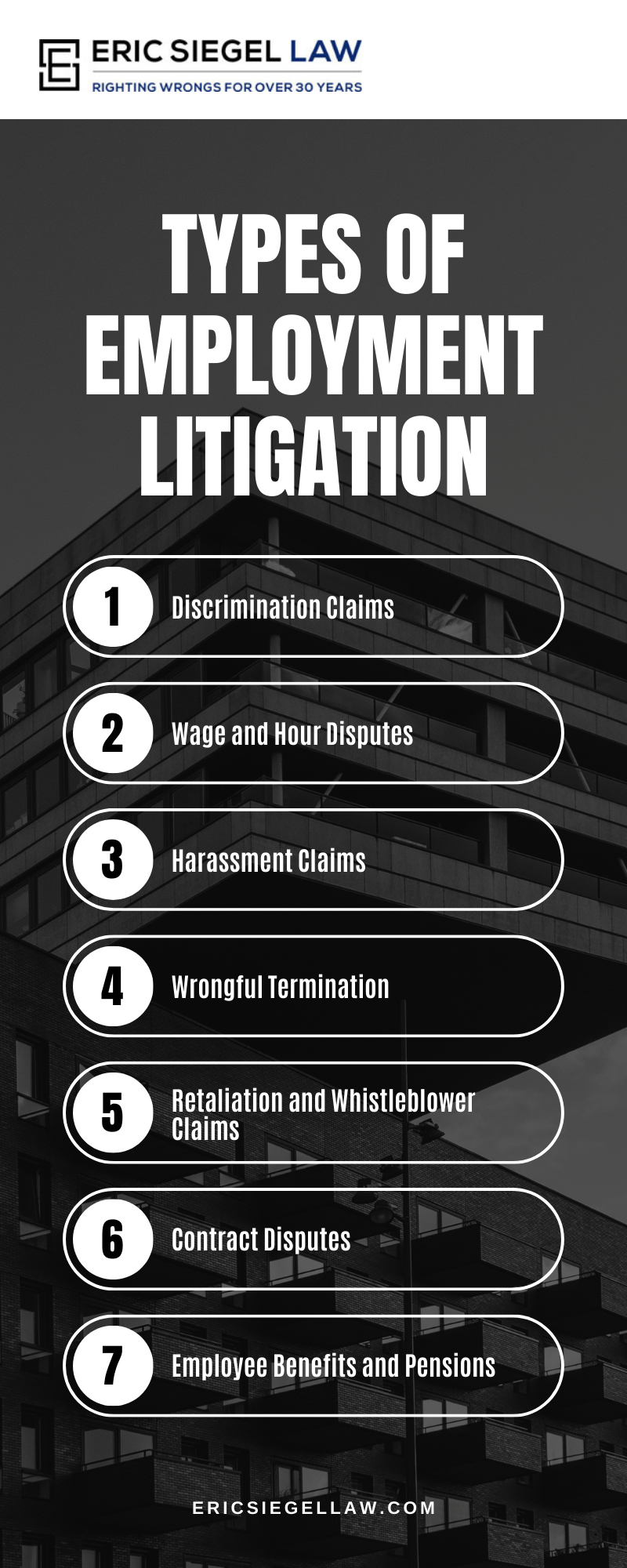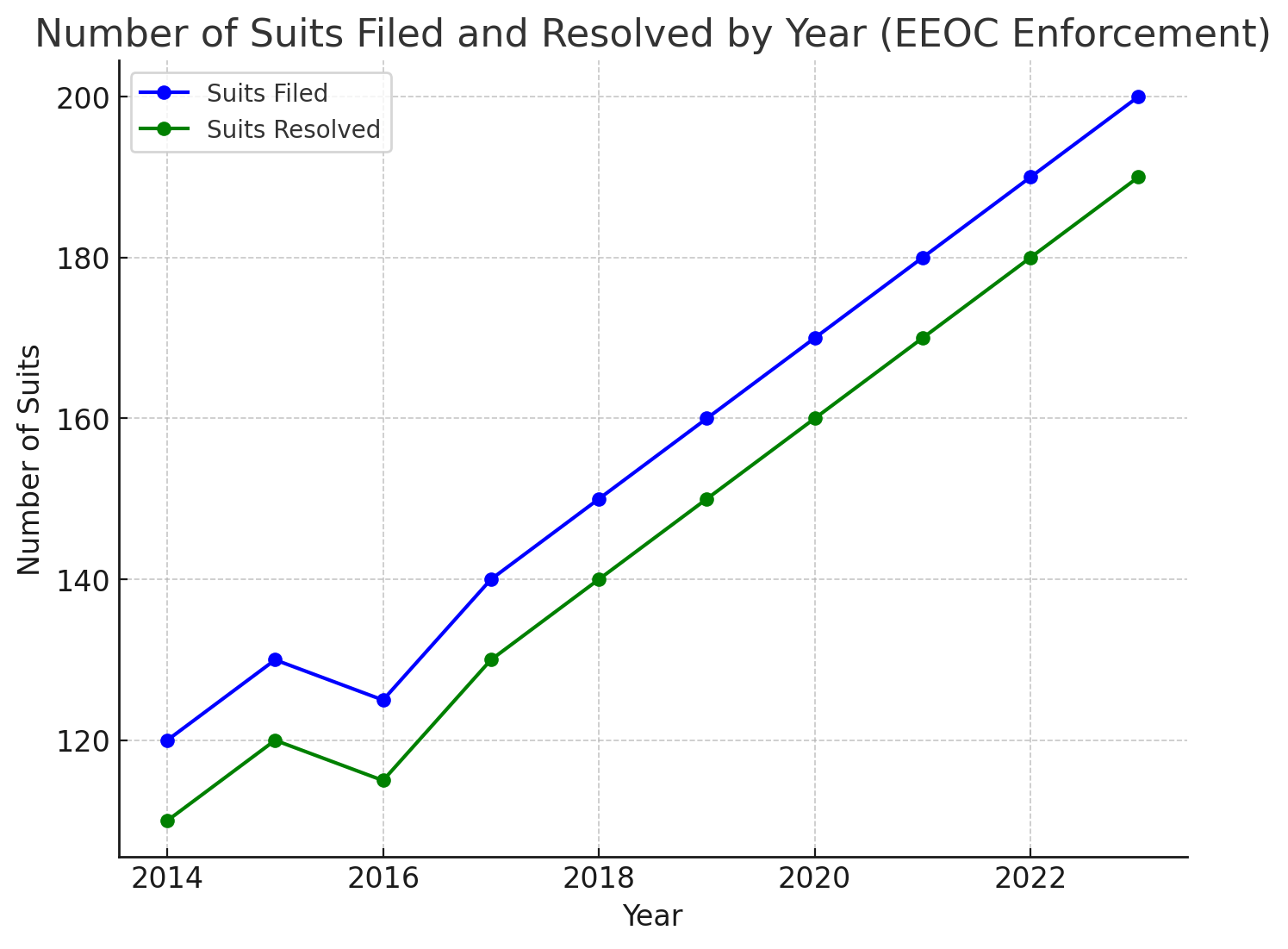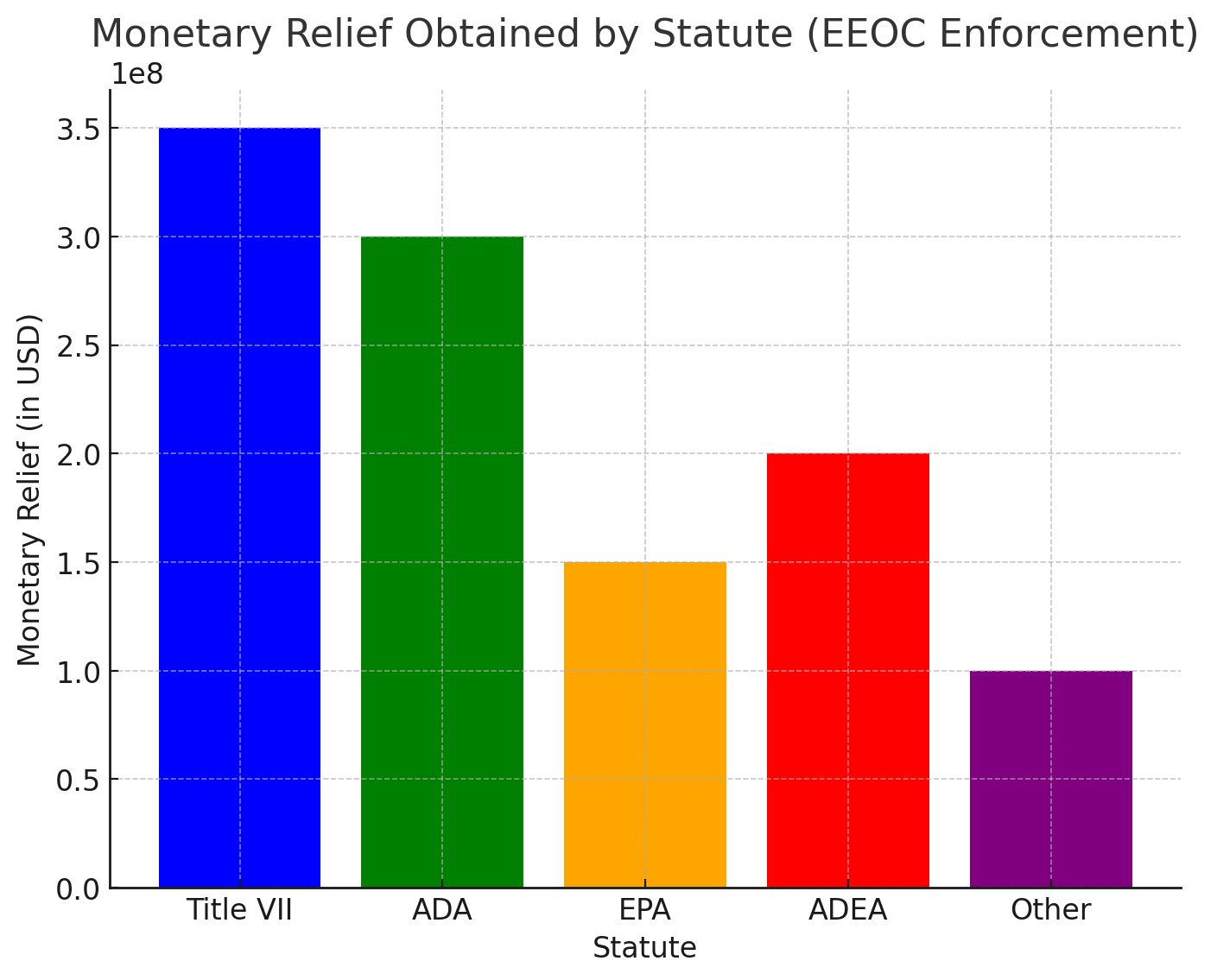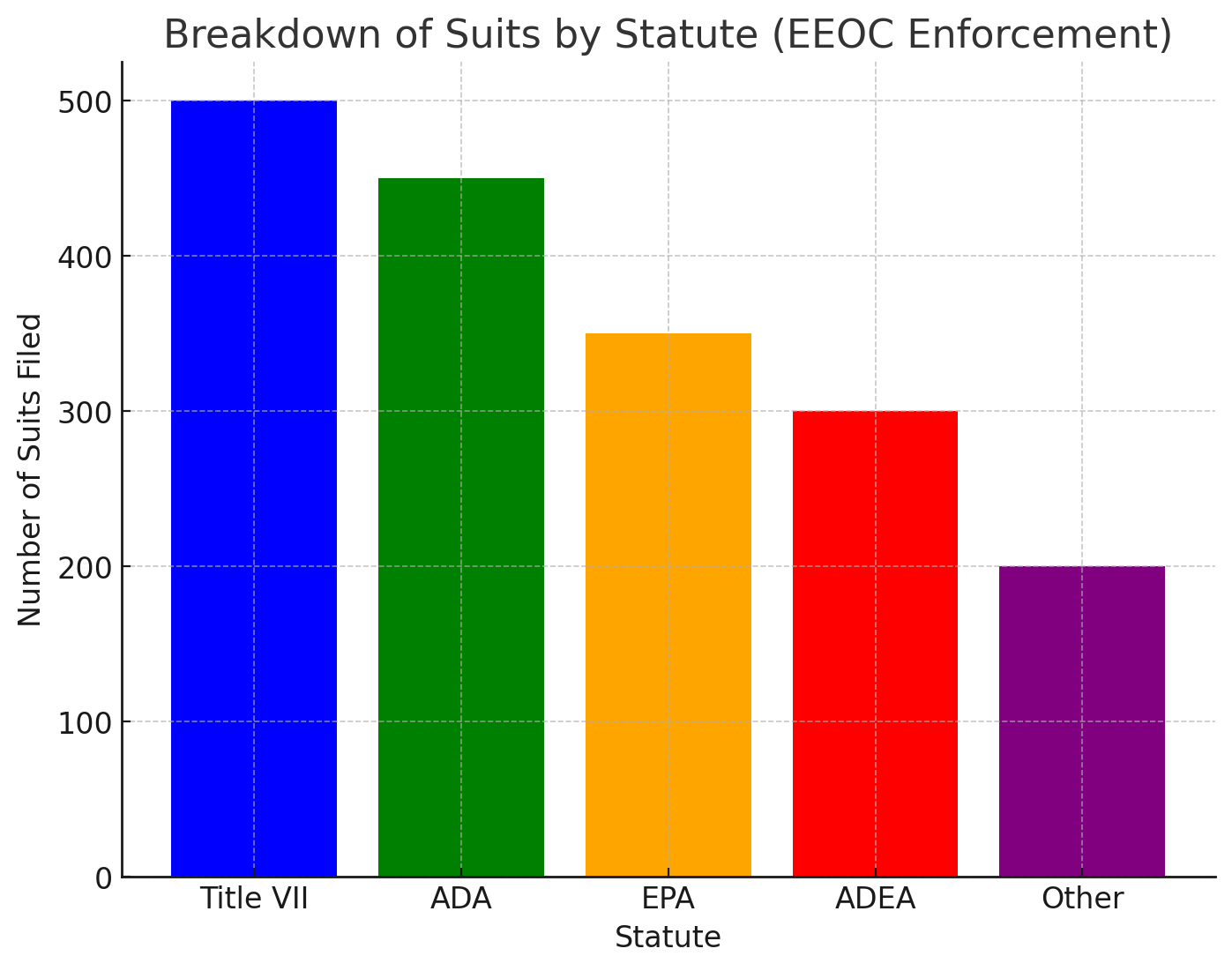
Employment Litigation Lawyer Washington, D.C.
At Eric Siegel Law, we are dedicated to representing clients in the heart of Washington, D.C., specializing in employment litigation. Our Washington, D.C. employment litigation lawyer possesses a profound understanding of employment law, making us adept at helping clients with various employment legal matters. Whether it’s a case of wrongful termination, discrimination, harassment, or wage and hour disputes, we are committed to providing our clients with the highest level of legal representation. Our approach is personalized and strategic, so that every client’s unique situation is addressed with the utmost care and professionalism. We have helped right wrongs for over 30 years. Schedule a consultation today.
Table of Contents
-
- Recognizing Employment Discrimination
- Washington Anti-Discrimination Laws
- Types of Employment Litigation Cases
- Washington Employment Litigation Infographic
- Washington Employment Litigation Statistics
- Washington Employment Litigation FAQs
- Washington Employment Litigation Glossary
- Eric Siegel Law, Washington Employment Litigation Lawyer
- Contact Our Washington Employment Litigation Lawyer Today
Recognizing Employment Discrimination
Immediate Steps to Take After Facing Discrimination
Upon encountering discrimination in the workplace, taking swift and decisive action is essential. Here are the steps we recommend:
- Document Everything: Keep detailed records of discriminatory incidents, including dates, times, locations, and the individuals involved. Correspondences, witness statements, and any related documents should be preserved as they can serve as valuable evidence.
- Report Internally: Follow your employer’s procedures for reporting discrimination. This often involves submitting a formal complaint to your human resources department. Document this process and any responses received.
- Seek Support: Discrimination can take a toll on your mental and emotional health. Consider reaching out to a support group or a counselor who can provide assistance during this challenging time.
- Understand Your Rights: Familiarize yourself with the relevant federal, state, and local laws that protect employees from discrimination. This knowledge will empower you as you move through the steps to address the issue.
- Consult with Our Employment Litigation Attorney: Early legal advice can be pivotal. We encourage you to contact us for an initial consultation. Our team can provide you with a clear understanding of your legal options and the best course of action.
Filing a Complaint with the Equal Employment Opportunity Commission (EEOC)
Before taking legal action, you may need to file a charge of discrimination with the EEOC or a similar state agency. This is a critical step, as it is a prerequisite for pursuing most types of employment discrimination lawsuits. Here’s a brief overview of the process:
- Timely Filing: Be aware of the time limits for filing a charge. In most cases, you have 180 days from the day the discrimination occurred to file a charge with the EEOC, which may be extended to 300 days if a state or local agency enforces a law that prohibits employment discrimination on the same basis.
- Provide Detailed Information: When filing your charge, be as detailed and accurate as possible about the incidents of discrimination. Include all relevant information and documents that support your claim.
- Cooperate with Investigations: Once your charge is filed, the EEOC will conduct an investigation. It’s important to respond promptly to requests for information and to participate fully in the process.
Should the EEOC investigation conclude in your favor, you may be given a “Notice of Right to Sue,” which allows you to file a lawsuit in court. This is where retaining our experienced attorney becomes invaluable. We can assist you in preparing your case, representing you in negotiations or court proceedings, and advocating for your rights as an employee and interests throughout the legal process.
Sexual Harassment in the Workplace
Sexual harassment in the workplace remains a pervasive issue, affecting countless individuals and undermining the integrity of professional environments. We are deeply committed to combating this form of misconduct. As experienced employment litigation attorneys, we understand the profound impact that sexual harassment can have on victims, both emotionally and professionally. This understanding drives our dedication to providing robust legal support to those affected, ensuring you are not alone in your fight for justice.
Sexual harassment can manifest in various forms, ranging from verbal comments to physical actions. It generally falls into two main categories: quid pro quo and hostile work environment. Quid pro quo harassment occurs when a job benefit, such as a promotion or raise, is directly tied to the acceptance of sexual advances or conduct. Conversely, a hostile work environment is created by unwelcome sexual conduct that is so severe or pervasive that it alters the conditions of employment and creates an abusive working atmosphere. Recognizing these distinctions is vital in identifying and addressing sexual harassment in the workplace.
Washington Anti-Discrimination Laws
In the heart of the nation’s capital, the fight against workplace discrimination is bolstered by some of the most comprehensive anti-discrimination laws in the United States. Our attorney specializes in handling these regulations to protect the rights of our clients. Washington, DC’s anti-discrimination law extends beyond federal protections, offering a robust shield against unfair treatment based on a wide array of characteristics.
Broad Protections Under DC Law
Washington, DC’s anti-discrimination statutes are designed to make sure that all employees have a fair and equitable working environment, free from bias and prejudice. These laws cover discrimination based on race, color, religion, national origin, sex, age, marital status, personal appearance, sexual orientation, gender identity or expression, family responsibilities, genetic information, disability, matriculation, or political affiliation. Our employment litigation attorney is deeply familiar with these protections and is adept at leveraging them to defend the rights of those subjected to discriminatory practices in the workplace.
Proactive Measures Against Discrimination
The District’s commitment to anti-discrimination extends to the requirement for employers to take proactive measures in preventing and addressing complaints of discrimination. This includes the implementation of policies and training programs aimed at fostering an inclusive workplace culture. Our legal responsibilities often involve advising organizations on compliance with these requirements, as well as representing individuals who have fallen victim to discrimination despite such measures.
Contacting the DC Office of Human Rights
The DC Office of Human Rights (OHR) plays a pivotal role in enforcing the city’s anti-discrimination laws. It provides a forum for individuals to file complaints and seek resolution in cases of alleged discrimination. Our knowledge includes guiding clients through the process of filing a complaint with the OHR, representing them throughout the investigation, and, if necessary, litigating their case to make certain justice is served.
Understanding the Legal Process
The various aspects of Washington, DC’s anti-discrimination laws can be daunting for both employees and employers alike. The broad spectrum of protected characteristics and the proactive obligations placed on employers can be challenging to decipher. Our team is equipped with the knowledge and experience to provide clear, strategic advice and representation to our clients.
Types of Employment Litigation Cases
Disputes between employees and employers can escalate into legal battles that necessitate professional intervention. As specialists in this field, we understand the myriad forms of employment litigation that can arise. Based in the heart of Washington, D.C., our firm knows how to overcome these legal challenges, ensuring our clients receive the representation they need to secure a favorable outcome.
- Discrimination Cases
One of the most common types of employment litigation involves discrimination. Discrimination in the workplace can be based on various factors, including age, sex, race, religion, disability, and more. These cases often require an in-depth understanding of both federal and state laws to effectively advocate for the rights of the aggrieved party. We work diligently so that our clients’ voices are heard, championing their rights and seeking justice for the wrongs they have endured.
- Wrongful Termination
Wrongful termination cases are another prevalent form of employment litigation. These situations arise when an employee is dismissed from their position for unlawful reasons, which may include retaliation, discrimination, or violation of employment contracts. Our attorney understands the profound impact such an event can have on an individual’s career and personal life. Our commitment is to meticulously examine the circumstances surrounding each case, leveraging our legal experience to restore our clients’ professional standing and secure appropriate compensation.
- Wage and Hour Disputes
Wage and hour disputes constitute a significant portion of employment litigation. These cases involve disagreements over unpaid overtime, minimum wage violations, and misclassification of employees as independent contractors. Effective handling of these disputes requires a detailed understanding of the Fair Labor Standards Act (FLSA) and other relevant laws. Our firm is experienced in resolving such disputes, so that our clients are fairly compensated for their work.
- Harassment in the Workplace
Harassment, particularly sexual harassment, is a grave issue that plagues many workplaces. These cases not only affect the victim’s mental and emotional well-being but also their ability to perform their job effectively. Our approach involves a sensitive yet assertive handling of harassment claims, advocating for a workplace environment that respects the dignity and rights of all employees.
- Retaliation Claims
Retaliation claims arise when an employer takes adverse action against an employee for engaging in legally protected activity, such as filing a complaint or participating in an investigation. These cases are particularly challenging, as they require proving a direct link between the employee’s action and the employer’s retaliatory behavior. Our attorney stands firm in our commitment to protect our clients from such unjust treatment, employing our extensive legal knowledge to build a strong case on their behalf.
Washington Employment Litigation Infographic
Washington Employment Litigation Statistics
The U.S. Equal Employment Opportunity Commission has created a table “that reflects EEOC enforcement suits filed and resolved in the federal district courts over the past ten years. The table divides the suits by the various statutes enforced by the EEOC and provides aggregate data on monetary relief obtained.”
Washington Employment Litigation FAQs
What Qualifies As Employment Discrimination In Washington, D.C.?
In Washington, D.C., employment discrimination occurs when an employer makes job-related decisions such as hiring, firing, promoting, or setting the terms and conditions of employment based on protected characteristics. These characteristics include, but are not limited to, race, color, religion, national origin, sex, age (40 and over), marital status, personal appearance, sexual orientation, gender identity or expression, family responsibilities, disability, matriculation, political affiliation, or genetic information. Discrimination can manifest in various forms, from direct actions against an employee to policies that disproportionately affect employees of a certain group.
Can I File An Employment Discrimination Claim Without Going Through The EEOC?
Yes, in Washington, D.C., you have the option to file an employment discrimination claim directly with the D.C. Office of Human Rights (OHR), bypassing the federal EEOC process. This local option may be preferred by some employees as it is specifically designed to address violations under the D.C. Human Rights Act, which provides broad protections. However, consulting with our experienced employment litigation attorney can help you determine the best course of action based on the specifics of your case.
How Long Do I Have To File An Employment Discrimination Lawsuit In Washington, D.C.?
The timeframe for filing an employment discrimination lawsuit in Washington, D.C., depends on the route you choose for filing your claim. If filing with the D.C. Office of Human Rights (OHR), you generally have one year from the date of the discriminatory act to file a complaint. If you opt to file a charge with the EEOC, the deadline is typically 180 days, which can be extended to 300 days if there is a corresponding state or local law. These deadlines underscore the importance of consulting with an attorney promptly after experiencing discrimination.
What Remedies Are Available If I Win My Employment Discrimination Case?
If you prevail in your employment discrimination case in Washington, D.C., several remedies may be available to you. These can include, but are not limited to, reinstatement to your job if you were terminated, back pay for lost wages, compensation for emotional distress, payment of legal fees, and possibly punitive damages if the employer’s actions were particularly egregious. The specific remedies awarded will depend on the details of your case and the extent of the discrimination you faced.
Is Mediation An Option For Resolving Employment Disputes?
Yes, mediation is often an option for resolving employment disputes in Washington, D.C., and can be a beneficial alternative to litigation. Mediation allows both parties to discuss their issues in a confidential setting with the goal of reaching a mutually acceptable agreement. The D.C. Office of Human Rights (OHR) and the EEOC both offer mediation programs at no cost. Opting for mediation does not waive your right to pursue litigation if a satisfactory agreement is not reached, and consulting with our Washington, D.C. employment litigation lawyer can help you move through this process effectively.
What is the D.C. Wage Payment and Collection Law?
This law pertains to all employers employing at least one other person in the District of Columbia. Employees are defined by this law as being any person permitted to work by an employer, except certain persons in bona fide administrative, executive, or professional capacities. Certain workers employed by the federal government, D.C. government, or railways are also exempt.
According to the law, employers must follow certain rules for paying employees, including:
- Employees must be paid at least twice per month on regular paydays
- Exempt employees must be paid monthly
- Wages are paid by check or cash
- Wages must be paid within 10 working days of the end of the pay period
- Terminated or quitting employees must be paid outstanding wages by the next working day
It also addresses how unused vacation or paid time off may or must be paid to employees. If you aren’t getting regularly paid or see a paycheck delay, talk to our employment lawyer.
Washington Employment Litigation Glossary
At Eglet Law, we are committed to serving clients in Washington, D.C. who face challenging employment disputes. As your trusted Washington, D.C. employment litigation lawyer, we understand that legal terms can be confusing. To help, we’ve created this glossary to clarify key terms frequently encountered in employment litigation cases. Our goal is to provide clear and practical information to help you understand your rights and options.
Equal Employment Opportunity
Equal Employment Opportunity (EEO) refers to the principle that all individuals should have an equal chance at employment without discrimination. Under federal and Washington, D.C. laws, employers cannot make decisions regarding hiring, promotions, or terminations based on protected characteristics such as race, gender, religion, national origin, disability, or age. EEO laws are enforced at the federal level by the Equal Employment Opportunity Commission (EEOC) and locally by the D.C. Office of Human Rights (OHR). Employers in Washington, D.C. are required to implement policies that prevent discrimination and provide equal opportunities to all employees and job applicants.
Hostile Work Environment
A hostile work environment occurs when workplace harassment becomes so severe or pervasive that it interferes with an employee’s ability to perform their job. Harassment may include unwelcome comments, physical actions, or visual displays that target a person’s race, gender, sexual orientation, or other protected characteristic. In Washington, D.C., employees are protected under both federal laws and the D.C. Human Rights Act, which offers broader protections against workplace harassment. Employers have a responsibility to address complaints promptly and take corrective action when necessary.
Wage And Hour Compliance
Wage and hour compliance refers to adherence to laws governing how employees are compensated for their work, including minimum wage requirements, overtime pay, and proper classification of employees. In Washington, D.C., employers must comply with both federal standards under the Fair Labor Standards Act (FLSA) and local laws, which often provide stronger worker protections. For example, D.C. mandates a higher minimum wage than the federal standard and has specific rules regarding paid leave and wage payment timelines. Employers must also make sure that employees are correctly classified as exempt or non-exempt to determine eligibility for overtime pay.
Quid Pro Quo Harassment
Quid pro quo harassment is a type of workplace harassment where job benefits, such as promotions, raises, or continued employment, are conditioned upon the acceptance of unwelcome sexual advances or other inappropriate conduct. This form of harassment typically involves someone in a position of authority exploiting their power over an employee. Under Washington, D.C. laws and federal regulations, quid pro quo harassment is strictly prohibited, and employers are required to take prompt and effective action to prevent and address such behavior. Employees who experience this should document the incidents and seek legal guidance to protect their rights.
Retaliation Protection
Retaliation protection refers to legal safeguards that prevent employers from punishing employees for engaging in protected activities, such as filing a discrimination complaint, participating in an investigation, or reporting workplace violations. Both federal law, through the EEOC, and local D.C. statutes provide robust protection against retaliation. Common forms of retaliation include demotion, salary reduction, negative performance reviews, or unjust termination following an employee’s complaint or involvement in legal proceedings. Employees who believe they have been retaliated against should act quickly to preserve evidence and consult with our employment litigation lawyers to explore their options.
If you believe your workplace rights have been violated, we are here to help. Contact our firm today for a consultation with our Washington, D.C. employment litigation lawyer who is dedicated to advocating for your best interests.
Eric Siegel Law, Washington Employment Litigation Lawyer
Contact Our Washington Employment Litigation Lawyer Today
If you or someone you know is facing sexual harassment in the workplace, reaching out for legal assistance is a critical step toward stopping the abuse and seeking justice. At Eric Siegel Law, we provide compassionate yet assertive representation, working tirelessly so that our clients’ voices are heard and their rights are protected. Our Washington employment litigation lawyer leverages an approach that includes a comprehensive evaluation of your case, guidance on documenting incidents of harassment, and strategic advocacy aimed at achieving the best possible outcomes. Call now to schedule a case review.
Client Reviews
“Attorney Eric Siegel is a very professional, committed, and attention to detail attorney. He will keep in touch at all times and make himself available. He gave me the right advice on how to handle my case and I appreciate this lawyer and I recommend him to anyone.”
Jimmy Malaver

